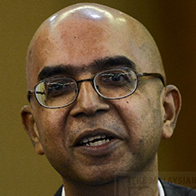Do you know who your Member of Parliament (MP) is? Do you know how your MP is supposed to contribute to the governance and wellbeing of Malaysia? Is your MP self-serving or honourable?
For many years my father was one of the highest-ranking civil servants in my hometown. Therefore he was invited to many government functions “graced” by an MP. I had no idea what an MP did. I just knew he was a man people kowtowed to.
During the decades I worked in industry, I never bothered to learn what work MP’s are supposed to do. It was only after Hindraf’s 2007 rally and Teoh Beng Hock’s 2009 death in custody that I began to learn what MPs are supposed to do.
I now know a few current and former MPs on both sides of the political divide. I know of some by reputation – for instance Dr Michael Jeyakumar of the Socialist Party whose profile is included in Alvin Ung’s excellent book Barefoot Leadership. I also know of Dr Jeyakumar from what people said of him while we held candles outside Bukit Aman during his immoral detention 2011 in the group known as the EO6.
I know of opposition MPs who expose failures of government: the late Karpal Singh, Lim Kit Siang, Tony Pua, Ong Kiang Ming, Charles Santiago, the late Datuk Abdul Nik Aziz Nik Mat, Hanipa Maidin, Zairil Khir Johari and Rafizi Ramli.
Karpal pursued justice. Nik Aziz pursued hudud. Jeyakumar pursues poverty and healthcare. Kian Ming and Tony pursue education and economics. Charles pursues the environment and labour. Zairil pursues harmony. Rafizi pursues corruption.
I know of ruling party ministers such as Khairy Jamaluddin, Datuk Seri Hishammuddin Hussein and Datuk Seri Ahmad Zahid Hamidi who play to the gallery in their race-based parties. I am sad that I cannot name a current ruling party MP who I think does what he’s supposed to do.
So, what’s an MP supposed to do?
A ruling party MP can hold offices such as minister or deputy minister. Those with ministerial posts comprise the Cabinet, also known as the Executive. Opposition MPs could be members of a shadow Cabinet. Those who do not hold ministerial posts could be members of parliamentary committees.
Presently our Parliament has five standing (permanent) committees, of which four focuses on affairs internal to parliament such as privileges and standing orders. The Public Accounts Committee is the only committee whose work has potential to improve day to day management of the nation.
In a Westminster-style government such as we have in Malaysia, the role of MPs is to scrutinise the executive, to hold them and their ministries accountable.
Scrutinising ministries is not just the role of opposition MPs. It’s also the role of ruling party MPs. Select committees are designed to enable MPs to scrutinise ministries.
Select committees are vested with power to call witnesses, question ministers, conduct research and make impactful recommendations to Parliament. Yet Malaysian MPs have little opportunity to be members of standing committees.
We have developed-nation infrastructure such as roads, ports, buildings, rail networks, satellite systems and power plants. We have highly educated citizens, many of whom are in the middle-class of society. We have expectations.
Gone are the days when politicians could remain in office just by shaking hands, attending functions and writing letters of support for awards of contracts. Malaysians with honour now expect MPs to exert themselves to make government better.
Malaysians with honour are now aware that the role of MPs is to make and tweak laws and policies, assure they are effectively implemented and make plans for the future.
That’s why MPs on both sides of the house should think carefully about how they will respond to a call made on March 6 by a group of eleven organisations to reform parliament.
This group, led by electoral reforms group Bersih 2.0, and known as Gabungan Cadangan Penambahbaikan Parlimen (GCPP – Parliamentary Reform Proposal Group), has called for the formation of standing committees.
Watch for your MP’s response to GCPP’s proposal to (1) form one standing committee to oversee each of the 35 ministries, (2) bar ministers and their deputies from being members of standing committees, (3) require the standing committees to hold public hearings, (4) require the chair to be from the ruling party and (5) compel every MP to be a member of a standing committee.
Your MP’s response will reveal why he or she is in politics. If the response is negative, you’ll know your MP is in office for self-serving reasons. If the response is positive, you’ll know you can applaud and support your MP. – March 12, 2015.
* This is the personal opinion of the writer or publication and does not necessarily represent the views of The Malaysian Insider.


Comments
Please refrain from nicknames or comments of a racist, sexist, personal, vulgar or derogatory nature, or you may risk being blocked from commenting in our website. We encourage commenters to use their real names as their username. As comments are moderated, they may not appear immediately or even on the same day you posted them. We also reserve the right to delete off-topic comments